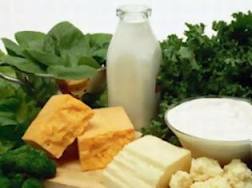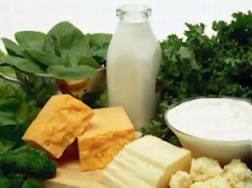By Andri Vassiliou, Dietitian - Nutritionist:
Osteoporosis is associated with reduced bone density and destruction of bone tissue (ie our bones) resulting in an increased chance of causing a fracture that causes problems in our daily lives. The best known way to check if you have osteoporosis is to have a bone mass test.
Factors associated with an increased chance of developing osteoporosis are:
1. The increase of age (especially in old age.
2. The rapid onset of menopause.
3. History of fracture after 40 years.
4. Very low weight below normal as defined by body mass index.
5. Diseases or conditions that increase the chances of a fracture.
6. Low calcium intake / absorption throughout life and especially during childhood, adolescence and adulthood.
Factors found to positively affect osteoporosis uptake:
Eat foods rich in calcium.
Getting enough calcium is the key to a strong skeleton
The main sources of calcium are dairy products (milk, cheese, yogurt).
It is recommended that adults and children over 9 years of age consume 3 servings of low-fat dairy products daily.
Semi-skimmed and skimmed milk contain the same amount of calcium and other nutrients (eg protein, water-soluble vitamins, etc.) as whole milk. The same goes for other low-fat dairy products such as yogurt and cheese.
If there is lactose intolerance yogurt and cheese are recommended as these products have less lactose than regular milk. Fresh milk with a reduced amount of lactose is also recommended.
Other sources of calcium are:
leafy vegetables with dark green color (spinach, okra, broccoli)
Or soft-bone sardines and salmon, calcium-fortified cereals, bread and fruit juices, oranges, calcium-fortified soy products, chickpeas.
Calcium supplements:
Absorption of calcium from dairy products is higher than calcium supplements. The human body can use up to 500mg each time from food or supplements for this and the consumption of calcium rich foods must be shared during the day to achieve greater absorption.
Ideas to get the calcium you need every day:
• Drink 1 cup of milk with your breakfast
• Add 1 cup of milk to your cereal
• Drink 1 cup of iced milk as a refreshing drink at any time of the day
• Add 2 slices of low-fat cheese to the sandwiches
• If you are hungry between meals eat a yogurt or a bowl of rice pudding or cream made with low fat milk
Accompany your meal with low-fat yogurt
• Use dark green leafy vegetables in salads
• Serve legumes or salads with sardines or soft bones
Eat foods rich in vitamin D:
Vitamin D plays an important role in bone health because it helps absorb calcium. Vitamin D is produced in the skin by exposure to sunlight. Over time, the skin's ability to produce vitamin D decreases. Also, older people who are not exposed to the sun do not have the ability to produce vitamin D.
The main sources of vitamin D are:
• The production of vitamin D in the skin with sun exposure (5-10 minutes per day)
• Dairy products and margarine products enriched with vitamin D.
• Fatty fish such as salmon, sardines, kolios
• Breakfast cereals fortified with vitamin D.
Regular physical exercise:
Bones are a living tissue that the stronger it is practiced the stronger it becomes. Walking, jogging, dancing are some of the activities that increase the bone density of the skeleton and protect it from osteoporosis.
Other factors that negatively affect:
• Increased caffeine intake. Limit your intake of caffeinated beverages to 1-2 a day (eg coffee, soft drinks, caffeinated energy drinks).
• A diet high in protein and salt increases urinary calcium excretion.
• Diet high in oxalic acid, ie spinach, cocoa, beetroot, beans, chocolate, nuts, etc. binds calcium to form calcium oxalates which can cause kidney stones.
• Smoking
• Fiber: fiber helps in proper bowel movement to prevent constipation, lower cholesterol, balance blood glucose and maintain a feeling of satiety. Too much fiber can adversely affect calcium absorption. Eating foods rich in fiber as part of a balanced diet is not associated with a negative effect on calcium absorption.
Andri Vassiliou, Dietitian-Nutritionist

